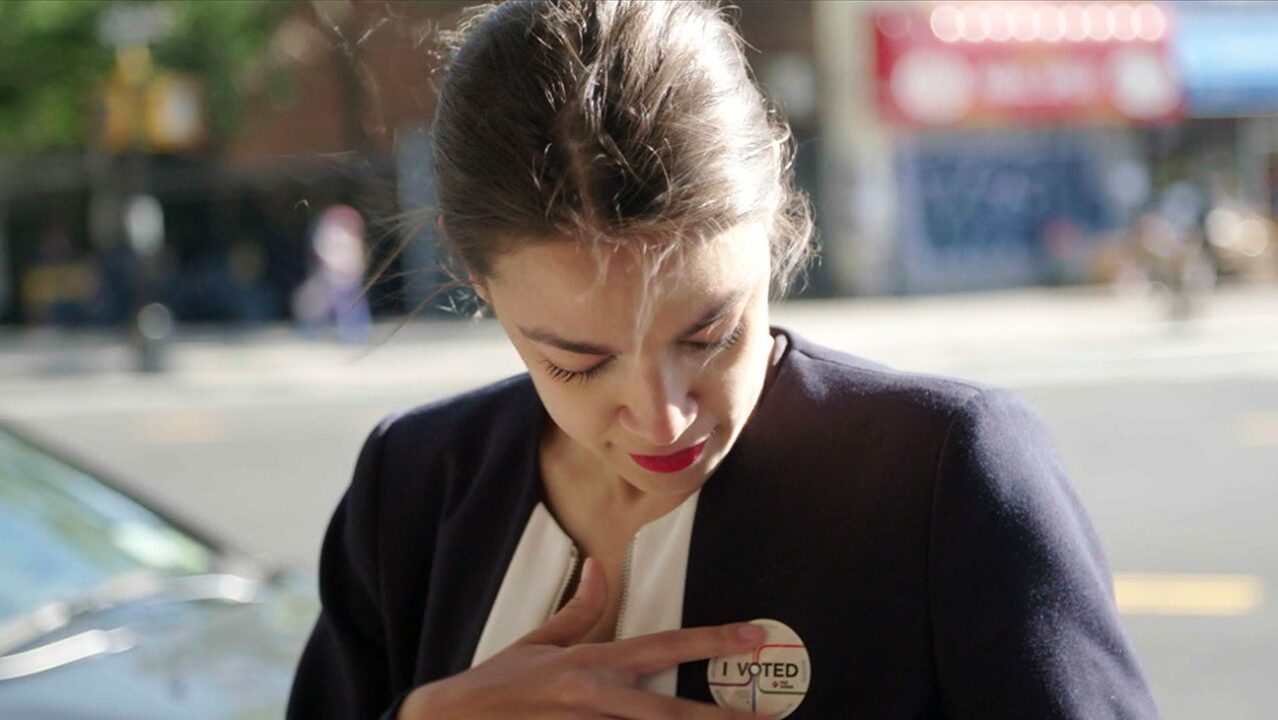KNOCK DOWN THE HOUSE (2019)
Starring Alexandria Ocasio-Cortez, Cori Bush, Joe Crowley
Directed by Rachel Lears
Written by Robin Blotnick, Rachel Lears
86 minutes. Rated PG. Now streaming on Netflix.
Knock Down the House had its world premiere at the 2019 Sundance Film Festival, where it earned a standing ovation, took home the Audience Award in the U.S. Documentary category, and landed the biggest deal in Sundance documentary history, with a $10 million dollar purchase by Netflix. Here’s what you need to know.
Spotlight on: Alexandria Ocasio-Cortez
Low-budget and born of energy and insistence, Knock Down the House has a great deal in common with the under-dog political candidates it profiles. This brisk, 86-minute documentary tracks the campaigns of 4 Democratic women running for the United States Congress in 2018. Of the four, only one wins her race. I’m referring, of course, to Alexandria Ocasio-Cortez, the now iconic Democratic Socialist who unseated 10-term Democratic incumbent Joe Crowley to become, at 29, the youngest woman to ever serve in the U.S Congress.
These candidates are under-dogs not only because they are women, or because they are first-time candidates, but because they are not independently wealthy and will not accept funds from corporate PACS. They reject the premise that to win political office, a candidate must possess corporate ties that allow them to mount multi-million dollar campaigns. If enough of them are elected, they intend to enact earth-shattering reforms of corporate control in our political system.
Political outsiders
Each candidate was a political outsider, offering a new mold for who can become an elected official. Alexandria Ocasio-Cortez of New York City was pulling shifts as a bartender and waitress to support her family. Cori Bush of Ferguson, Missouri was a nurse and pastor drawn further into politics by the shooting of Michael Brown and ensuing protests against police brutality. Amy Vilela of Las Vegas, Nevada was a working mother motivated to advocate for affordable health care after her daughter died of a preventable condition. Finally, Paula Jean Swearengin of West Virginia was an activist outraged by the human and environmental abuse of the coal industry. In her community, Swearengin has an encyclopedic knowledge of which families have been affected by the soaring, rates of childhood and adult cancers in the mining-heavy mountain towns.
2018 was a historic year for women in politics
You might think it’s unfortunate for the documentary’s narrative that only one of its profiled candidates made it to Congress. However, Lear’s subjects make the cogent case that this is an outcome that must be acknowledged and braced for and that losses play as much a role in the Democratic process as victories, if not more. For every woman who makes it through to Congress, hundreds try. And each that tries her hand builds the infrastructure, energy, and sense of normalization that allows women to govern in a system still defined by un-representative, imbalanced male majorities.
After all, the historic election cycle of 2018 saw 109 women seated in the U.S. House of Representatives. While easily the highest number in United States history, this still represents only 25% of House seats. The film’s choice to follow all Democrats to portray the increased presence of women in office is motivated by political realities also. Of the women seated in the 2019 House of Representatives, 87.3% are Democrats.
In one of the film’s most energizing moments, Cortez encapsulates this persistence in a single sentence, as she offers her young niece some advice. Cortez explains, “For every 10 rejections, you get one acceptance. And that’s how you win everything.”
Female power in front of and behind the scenes
Director Rachel Lears emulates this dogged, never give up attitude. Working on a shoe-string budget cobbled together from grants and a modest Kickstarter campaign, Lears often pulled double or triple duty as she traveled the country getting to know these women, their histories, and their campaigns. She was the director, but also often the cinematographer, cameraperson, and producer.
The rush to prep the film for a Sundance Film Festival premiere shows through a bit in the structure, which lurches between the four candidates, trying to do each justice. And the final product has a pronounced lean towards the magnetic oratory, sincere resolve, and unlikely ascendancy of Alexandria Ocasio-Cortez. One wonders if, with Netflix on board to distribute, we will ever see an expanded edition or a sequel. But for the moment, this serves as a quick and impassioned document of the women who are hurling themselves at elected office with the urgency that this era of economic inequality, environmental collapse, and social upheaval asks of them. They are cracking the glass nationwide and slipping through. They are ready to serve.
8/10
This review originally ran on February 12, 2019, during the Sundance Film Festival
Kailee Andrews
Kailee holds a Communication Arts B.A. from the University of Wisconsin. At 21, she programmed her first film festival for an audience of 4,000+ on campus. Since then, it's been all about sharing the cool arts and crafts of cinema.

